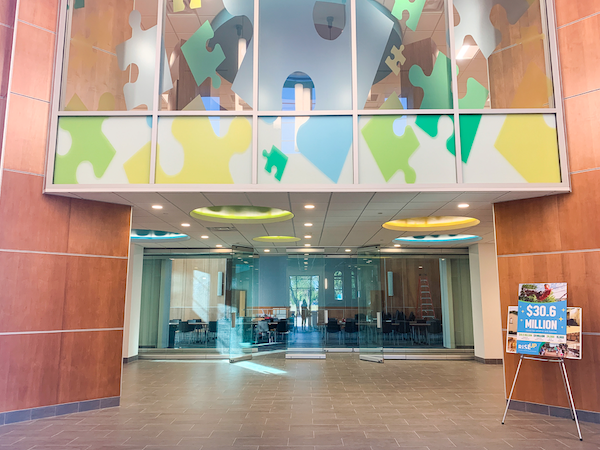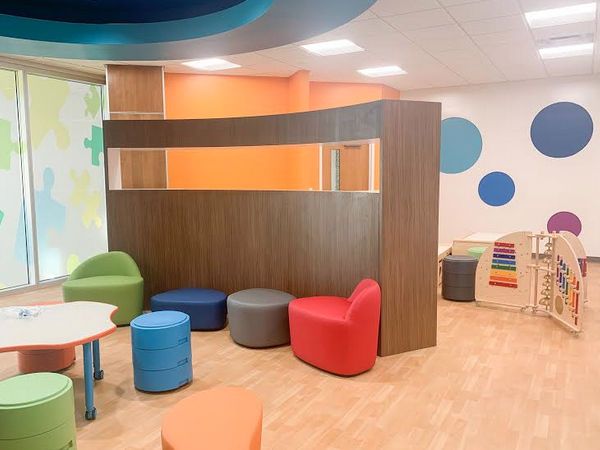
St. Joseph’s Villa spent $9.5 million to do a substantial renovation of the Sarah Dooley Center for Autism. (Photos courtesy of St. Joseph’s Villa)
A local nonprofit is putting the finishing touches on a renovation to its center for autism, improving its educational facilities while also adding a new training program.
St. Joseph’s Villa, which provides education, mental health and housing services, expects to wrap up a $9.5-million renovation project at its Sarah Dooley Center for Autism in March after it broke ground on the project in 2019. The center is a school for students with autism, and it will also become a regional training center for school teachers and other professionals who interact with autistic students.
The 24,000-square-foot school building will have facilities for students to learn independent living skills, a sensory library, a healthcare suite and observation areas for parents, trainees and researchers. In addition to a school experience, the center offers after-school programs, career services, day programming for adults and other services.
The center will continue to be able to accommodate 100 students in its educational program.
The nonprofit has served children with autism for more than four decades. The autism center draws its students, which are placed in its program by public school systems, from 26 localities in Central Virginia. The center’s educational programing is focused on helping students transition to their public schools.
“Our goal is to replicate what they will get in a public school,” CEO Kathleen Burke Barrett said. “Because repetition is so important to students with autism, we want them to be able to go back into a classroom setting and be comfortable with it.”
The renovated building, located at the nonprofit’s 82-acre campus at 8000 Brook Road in Henrico County, will also feature the 250-person Campus Center, an events space for conferences and other programs.
In addition to teaching students with autism, the center will also be a learning facility for professionals who serve students with autism, a growing population in Virginia’s public school system. The center will feature autism-specific classrooms that are intended to be something that can be duplicated elsewhere with resources available to public schools.
The center will hold training programs for professionals such as teachers, bus drivers, pediatricians and aides, as well as parents, with a goal of graduating 1,000 professionals a year.
The bulk of the costs associated with teaching professionals will come from donations, though there will be a small fee to attend.
“We could never be a school big enough, there’s a tsunami of students with autism coming. But we want to have a ripple effect,” Barrett said. “We want to train public school teachers so they can go back and take care of kids (at their schools).
The CDC estimated that 1 in 68 children have been diagnosed with autism when St. Joseph’s started fundraising for the center’s renovation. The CDC now estimates 1 in 54 children in the United States have been diagnosed with autism.
The nonprofit expects to welcome students to the revamped center in the fall. The professional training curriculum is still in development, a process that’s been set back by the coronavirus pandemic. A dedication ceremony is expected but a date hasn’t been set.
“The teacher training project has been delayed by COVID because we’ve had to pivot to operate both in-person and distance learning for a year. But building a virtual school for autism over the last year has definitely taught us valuable lessons that we will take into our curriculum project and will help make the distance learning component of our trainings more robust,” a spokesman for the nonprofit said in an email.
St. Joseph’s has funded the project with a portion of the $30.7 million raised through its five-year RiseUp fundraising campaign, which wrapped up in February. The campaign was the largest the nonprofit has conducted since it was founded in 1834.
The remaining funds are for repairs and renovations to other buildings on its campus, a playground for older children and upgraded HVAC systems, among other improvements.
The nonprofit also runs the Dooley School, a separate education initiative that serves students with behavioral disabilities, though some students with autism are enrolled in that program.

St. Joseph’s Villa spent $9.5 million to do a substantial renovation of the Sarah Dooley Center for Autism. (Photos courtesy of St. Joseph’s Villa)
A local nonprofit is putting the finishing touches on a renovation to its center for autism, improving its educational facilities while also adding a new training program.
St. Joseph’s Villa, which provides education, mental health and housing services, expects to wrap up a $9.5-million renovation project at its Sarah Dooley Center for Autism in March after it broke ground on the project in 2019. The center is a school for students with autism, and it will also become a regional training center for school teachers and other professionals who interact with autistic students.
The 24,000-square-foot school building will have facilities for students to learn independent living skills, a sensory library, a healthcare suite and observation areas for parents, trainees and researchers. In addition to a school experience, the center offers after-school programs, career services, day programming for adults and other services.
The center will continue to be able to accommodate 100 students in its educational program.
The nonprofit has served children with autism for more than four decades. The autism center draws its students, which are placed in its program by public school systems, from 26 localities in Central Virginia. The center’s educational programing is focused on helping students transition to their public schools.
“Our goal is to replicate what they will get in a public school,” CEO Kathleen Burke Barrett said. “Because repetition is so important to students with autism, we want them to be able to go back into a classroom setting and be comfortable with it.”
The renovated building, located at the nonprofit’s 82-acre campus at 8000 Brook Road in Henrico County, will also feature the 250-person Campus Center, an events space for conferences and other programs.
In addition to teaching students with autism, the center will also be a learning facility for professionals who serve students with autism, a growing population in Virginia’s public school system. The center will feature autism-specific classrooms that are intended to be something that can be duplicated elsewhere with resources available to public schools.
The center will hold training programs for professionals such as teachers, bus drivers, pediatricians and aides, as well as parents, with a goal of graduating 1,000 professionals a year.
The bulk of the costs associated with teaching professionals will come from donations, though there will be a small fee to attend.
“We could never be a school big enough, there’s a tsunami of students with autism coming. But we want to have a ripple effect,” Barrett said. “We want to train public school teachers so they can go back and take care of kids (at their schools).
The CDC estimated that 1 in 68 children have been diagnosed with autism when St. Joseph’s started fundraising for the center’s renovation. The CDC now estimates 1 in 54 children in the United States have been diagnosed with autism.
The nonprofit expects to welcome students to the revamped center in the fall. The professional training curriculum is still in development, a process that’s been set back by the coronavirus pandemic. A dedication ceremony is expected but a date hasn’t been set.
“The teacher training project has been delayed by COVID because we’ve had to pivot to operate both in-person and distance learning for a year. But building a virtual school for autism over the last year has definitely taught us valuable lessons that we will take into our curriculum project and will help make the distance learning component of our trainings more robust,” a spokesman for the nonprofit said in an email.
St. Joseph’s has funded the project with a portion of the $30.7 million raised through its five-year RiseUp fundraising campaign, which wrapped up in February. The campaign was the largest the nonprofit has conducted since it was founded in 1834.
The remaining funds are for repairs and renovations to other buildings on its campus, a playground for older children and upgraded HVAC systems, among other improvements.
The nonprofit also runs the Dooley School, a separate education initiative that serves students with behavioral disabilities, though some students with autism are enrolled in that program.




What an accomplishment! Hats off to everyone involved. This is going to be a tremendous community asset.